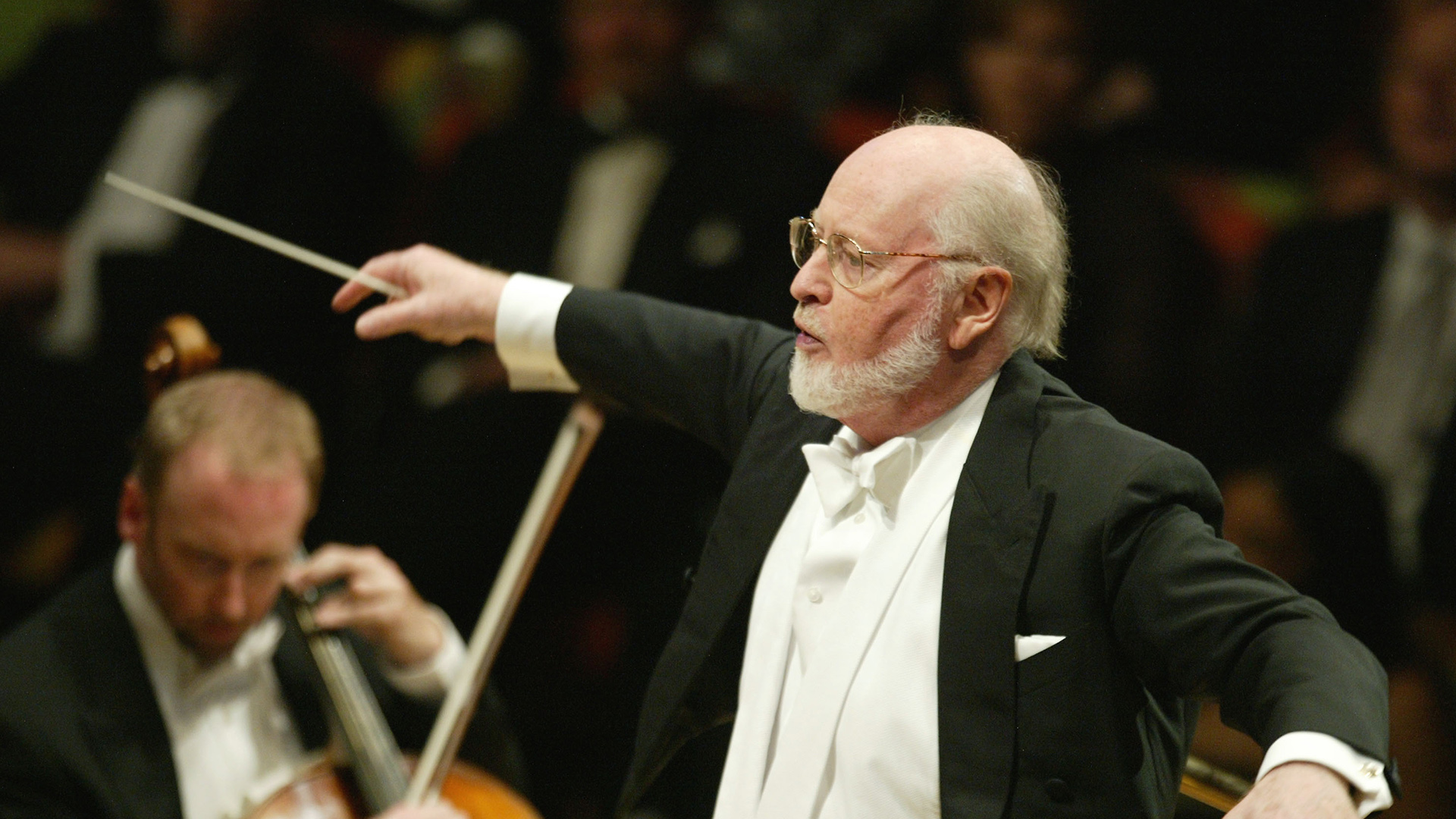The best John Williams movie scores to test your hi-fi system
Our go-to test tracks from the movie maestro's epic collection

We test every piece of hi-fi kit that comes our way with a huge variety of music genres, from rock and pop to hip-hop and jazz, not forgetting a healthy dose of classical music. And no composer's body of work gets as much of a workout as the great John Williams – even if it is a close run thing with Hans Zimmer.
With a career spanning seven decades that includes a recurring collaboration with Steven Spielberg, not to mention a musical offering for every single Star Wars trilogy to date, John Williams has an astounding body of work. The celebrated composer has scored nearly every major movie from your childhood, from the 1970s to the noughties, spanning huge film franchises and fantasy classics to Oscar-worthy pictures and more. He is quite simply one of our favourites.
However, this isn't a list of our favourite Williams tracks. That would be an extremely long list that would take forever to pen. This is a carefully considered selection of the best test tracks from Williams that we constantly play during our reviewing of hi-fi products – speakers, amplifiers, turntables, systems, DACs and headphones – in our dedicated listening rooms. Tracks that we know and love, that no amount of repeat play will diminish; tracks that push even high-end hi-fi systems to the limits; tracks that reveal just how well something can handle, well, everything.
John Williams' scores are forever tied to their films and it's paramount (to him and to our testing) that we should feel the emotion he's trying to elicit from the music to augment what's happening on screen. While we listen out for all the usual sonic qualities – deep basslines, clear highs, strong mids, the scale of sound, superb timing and dynamics – it ultimately comes down to whether the song makes you feel as intended. Is this system delivering its musical intent coherently and in a way that genuinely connects with you?
You'll likely have your own favourites (and please, list them below in the comments if you do!), but here's a rundown of our nine picks from the music maestro when testing hi-fi systems.
- 8 of the best classical music tracks for testing speakers
- Listen to our John Williams playlist on Tidal.
Theme from Jurassic Park
This is the track that gets the most replay during testing, and no matter how many times we've heard it, the Jurassic Park theme is still utterly wondrous. Easily one of Williams' greatest works and a sure test of your system's fidelity. And, crucially, of how it elicits a certain emotion from the music.
Williams said this score was an attempt "to capture the awesome beauty and sublimity of dinosaurs in nature." Essentially, if you're not struck by the awe and wonder of seeing a dinosaur for the first time, every time you hear this song, your system isn't doing its job.
The latest hi-fi, home cinema and tech news, reviews, buying advice and deals, direct to your inbox.
We find the gentle intro, with the horn call and the beautiful flute solo, is a fantastic test of how your system handles music at low volume – it should still draw you in immediately regardless of volume. This works for high-end and budget hi-fi: you'll know how capable your kit is just with the first few seconds. There should be enough detail, grip and dynamic subtlety to capture your attention and keep you hooked.
As the song expands to the strings and wind sections, it becomes a richer timbre and fuller sound, swelling in scale – your system should have the dynamic subtlety and ability to build up to the reveal, in increasing but fluid intensity, to the big flourish.
It's not the most overly dramatic effect, but one that should stir you into feeling the child-like glee of seeing (in your mind) a Brachiosaurus. Even if you've not seen the film (which you really should), that sense of wonder and delight should still come through. And with the best kit, it's there for us, every single time.
Main Title and First Victim (Jaws)
That two-note tuba tune. Williams manages to pack so much menace and threat into those simple two notes. Notes that are so deep and low that you feel them more than hear them – or at least, that's what your system should deliver.
It's not just about how deep those notes are. Lesser systems will simply outline two notes; the better and best systems will deliver layers of texture around each note.
Your system will also need to be deft with tightly controlled, precise timing. With gripping drive and attack, the best systems will ratchet up the tension and impending sense of panic as the notes speed up in tempo. It should be palpable.
Rey's Theme (Star Wars: The Force Awakens)
If we were compiling a list of John Williams' best ever scores, we'd throw the entire Star Wars soundtrack in here. All of them, from The Imperial March to the Cantina Band to Princess Leia's Theme.
But we're focusing on tracks we've found most useful for testing, and the one track we've latched on to since we first saw the film is Rey's Theme from The Force Awakens. It's a lovely piece of music that's ideal for testing the scale and spaciousness of sound.
The sparse and rather muted beginning should still come across huge-scaled and airy through your speakers. Led by a flute solo – agile and fluid – before the rest of the woodwinds and strings join in, your speakers (and system) should convey the amount of space surrounding the instruments. The song should have plenty of breathing space. The way the individual instruments are conveyed in clear, sweet detail before combining into a fuller orchestra should be handled with delicacy and a terrific sense of authority and timing.
You'll also need to watch out for the tinkling high notes from the marimba, glockenspiel and harp – which shouldn't sound sharp or distracting. It should all meld into one harmonious whole. Once again, lesser systems will simply deliver all the individual sounds as outlines. Your system should make the shape and solidity of each instrument being played crystal clear – there should be depth and weight.
The way the track tails off again at the end is also a great test of how well your system handles dynamic shifts and moods.
Theme from Superman
We could quite easily have picked the Star Wars title theme, Hedwig's Theme from the Harry Potter films, The Raiders' March or countless other iconic film themes.
But whether it's a man in a cape or yellow text crawling up the screen, Williams knew how to capture the excitement and spirit of the hero-adventure story you're about to witness. And unlike some of the slow burns we like on this list, Superman's theme grabs your attention right from the start with its triumphant, jubilant tone.
Your system should be able to handle big orchestral crescendos, large-scale dynamics and a huge spread of clashing orchestral instruments that sound of a piece and not too brash or messy.
From the initial trombone fanfare to the brassy trumpet and snare drums, this should push your system to the limit in terms of how well it can manage those high frequencies. Never too bright or harsh, but with enough bite to make the desired impact. And the whole track should feel uplifting, not attacking or dense.
The deeper drum notes in the theme could easily get lost in the mix, but the best systems should offer them as a grounding force, with a taut rhythm underpinning the score.
Theme from Schindler's List
A gorgeous, mournful piece of music with an absolutely stunning violin solo that rips through your heart. Israeli-American violinist Itzhak Perlman, largely considered to be one of the greatest violinists in the world, takes centre stage here.
The violin seems to take on a life of its own. All your system has to do is deliver the richness of the violin notes, the fluid dynamics of the tune, and a convincing level of detail.
The ebb and flow of the violin's rhythm should conduct your emotions, and your system's detail retrieval, clarity and transparency should reveal when Perlman applies pressure on the bow across the strings and when he uses a lighter touch.
Of course, a violin can easily be rendered in a screeching manner, and this is where you'll find out if your system combination is too lean or too bright, or not as nimble-footed or as natural-sounding as it should be. There are plenty of elements that need to combine to deliver this track faithfully, but this is a track that reveals just how well your hi-fi system can convey the heart of the music.
A Prayer for Peace (Munich)
While we're sticking with the mournful themes, the focus here is more on the strings and a haunting cello melody.
From the sweeping strings of the low cello to the plucking of classical guitar strings, it's a different flavour from Williams’ usually big-band orchestral arrangements.
While the cello soloist on the original soundtrack is American Steve Erdody, we couldn't resist showcasing the above video of the incomparable YoYo Ma partnering with Williams. After all, YoYo Ma rules.
Your system should be able to reveal the gravity underpinning those low cello notes, and have the grip and authority behind each sweep of the bow. There should be a lovely contrast against the more agile, precisely plucked guitar strums that are layered on top, but still complement the cello seamlessly.
This is a showcase of how each instrument can be conveyed individually and well-formed through speakers and amplifiers, while still working in tandem and sound as a musical whole.
Movement 1: Closing In (Catch Me If You Can)
Or, to give its full track title: Escapades for Alto Saxophone and Orchestra "Catch Me If You Can": Movement 1: Closing In.
This playful, cat-and-mouse, jazz-inspired noir piece perfectly captures the film's central premise of an FBI agent chasing a con man. It also mirrors the Saul Bass-inspired opening credits of the film – a harmonious meld of sound and vision.
The undulating saxophone notes are tightly wound and intricate, but need a heroic ability to marshall every note with absolute control and composure.
This track – a nice departure from Williams' typically sweeping orchestral epics – is a stellar test of just how skilled your system is at timing and agility. It should be snappy and light-footed; there's no space for any flab or heavy-handedness here. It's a fleeting tone, full of intrigue, that even the bassier notes can't damp down.
Hymn to the Fallen (Saving Private Ryan)
Speaking of big, sweeping orchestral pieces – Hymn To The Fallen might sound like it will start off in the same vein as many of Williams' epic film themes with horns, but it dovetails into a more sombre, militaristic tune.
The vocal chorus adds an extra layer of texture and instrumental complexity (human voices) into the mix. Williams still uses horns and strings to evoke emotion, but it's a more solemn tone to suit the film.
It's actually a rather simple rhythm, with that staccato military drum beat keeping rhythm throughout in the background. But in some ways, it can be difficult for a sound system to keep your attention rapt when there aren't big swings or catchy leitmotifs to latch on to. The best system will keep your attention on the subtler changes in the score, engaging you enough to keep listening. The best system will show why a track is rhythmically interesting, even if at first listen it might not be obvious.
This poignant and stirring score will benefit from a system that has an authoritative grip, can go loud and big in scale with ease, and never lose the strict pace of that repetitive drum beat.
Dual of the Fates (Star Wars: The Phantom Menace)
We couldn't resist another Star Wars entry, and Duel of the Fates is a diametrically opposite counterpart to the more subdued Rey's Theme.
Epic, operatic, heightened – this is as dramatic as you can get. Soundtracking one of the most impactful, well-choreographed lightsaber fights in the films, Williams said he imagined for the duel's score "that something ritualistic and/or pagan and antique might be very effective".
Using a full orchestra and a full choir singing in loosely-translated Sanskrit, this is John Williams using all the powers at his disposal. Foreboding and intense, this score needs all the power, wallop and scale your system can handle. Every orchestral instrument is thrown into the mix, and while it can be tempting to single out individual instruments, this is a track where the entire company moves as one.
Every element of your system will be put to the test: scale, dynamics, timing, rhythm, clarity, composure, detail, how high or low it can reach, and how loud it can go without distortion. Ultimately, this should be an epic blast of sound and fury, with delicate moments from the clarinets, harp and strings playing the main melody giving some respite. The final chant and flourish should end on a soaring, intense high and, if your system has done its job, leave you breathless.
MORE:
The best test tracks to trial your hi-fi system
15 of the best-produced recordings of all time to test your hi-fi speakers
9 test tracks you've probably never heard of (but should try with your hi-fi system)

Kashfia is the Hi-Fi and Audio Editor of What Hi-Fi? and first joined the brand 13 years ago. During her time in the consumer tech industry, she has reviewed hundreds of products (including speakers, amplifiers, turntables and headphones), been to countless trade shows across the world and fallen in love with hi-fi kit much bigger than her. In her spare time, Kash can be found tending to an ever-growing houseplant collection and shooing her cat Jolene away from spinning records.
